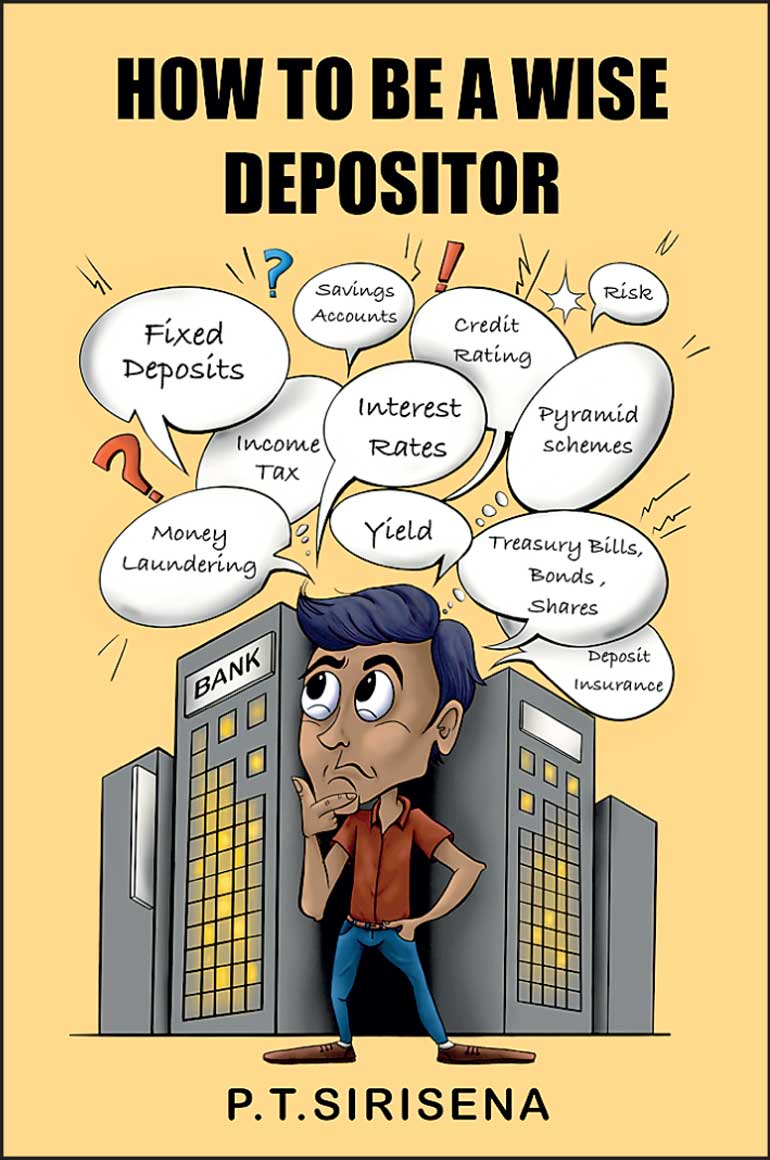Monday Feb 16, 2026
Monday Feb 16, 2026
Monday, 13 March 2023 00:45 - - {{hitsCtrl.values.hits}}
 Based on his immense hands-on experience in the financial sector, P.T. Sirisena who is a former Director of Bank Supervision of the Central Bank of Sri Lanka and a former Adviser to the Republic of Maldives, has authored the book titled ‘How to be a Wise Depositor’ to guide the public to make prudent investment decisions avoiding falling prey to dubious financial arrangements.
Based on his immense hands-on experience in the financial sector, P.T. Sirisena who is a former Director of Bank Supervision of the Central Bank of Sri Lanka and a former Adviser to the Republic of Maldives, has authored the book titled ‘How to be a Wise Depositor’ to guide the public to make prudent investment decisions avoiding falling prey to dubious financial arrangements.
This volume could be considered a pioneering contribution to disseminating the nitty-gritty of safe investment options available to savers and depositors in complex financial systems in the modern digital world.
Elevating financial literacy crucial
The author states that he was prompted to write this book by witnessing the sad plight of depositors who lost their hard-earned money due to unwise investment decisions anticipating attractive rates of return from illegal operators. In recent times, thousands of innocent individuals and families have fallen victim to numerous crooks engaged in dubious activities such as illegal deposit collection, pyramid schemes, and money laundering.
As the author highlights, such calamities could have been avoided had the depositors possessed some basic knowledge about secured savings options. The rate of financial literacy, which means the knowledge and skills needed to make financial decisions, remains as low as 35% in Sri Lanka as against the general literacy rate of 93%.
The author invites the ordinary depositor to walk through the remote corridors in the financial sector such as government securities, corporate bonds, share market, and unit trusts, which are usually accessed only by elitist investors. The book, which contains 14 chapters and 5 annexures, is written in a reader-friendly style using the question-and-answer format.
Depositing money in financial institutions
The author begins the book by introducing different deposit schemes offered by formal financial institutions consisting of commercial banks, licensed specialised banks, and finance companies, which are subject to regular supervision by the Central Bank. In addition, cooperative societies, building societies, and non-profit making organisations are permitted to accept deposits under separate legal provisions. He goes on to explain the procedures to be followed in opening and maintaining savings and fixed deposits in financial institutions.
Technicalities involved in using Automated Teller Machines and online banking are explained in simple language. As regards digital bank cards, for instance, the author mentions that money is immediately withdrawn from the customer’s account when using debit cards while a credit facility is offered to the customer when using credit cards. He underscores the convenience of using online banking vis-à-vis physical visits to banks for day-to-day transactions such as fund transfers and utility bill payments.
 Government securities
Government securities
Government securities are recognised as the unique zero-risk investment instrument across the world. However, the Government securities market in Sri Lanka is not well developed yet, compared to advanced financial markets. Factors such as low levels of household savings, fragmented money and capital markets, and high inflationary expectations are the major hindrances to developing this market. The lack of awareness about Government securities among ordinary depositors is another reason for the setback. The author makes an effort to fill this vacuum by explaining Treasury Bills and Bonds, and Sri Lanka Development Bonds (SLDBs).
The specific procedures to be followed in investing in short-term Treasury Bills and long-term Treasury Bonds and their yield rates are discussed in detail. The book also contains useful information for potential investors in SLDBs, which are debt instruments denominated in US dollars issued by the Central Bank on behalf of the Government.
Investing in corporate debt market
Corporate debt instruments consisting of bonds, debentures, and equities (also known as shares or stocks) are used by companies to raise borrowings from the public to finance their operations. The book vividly explains the issuance procedures, yield rates, and financial benefits of each of such instruments. It also guides the reader concerning the factors to be checked in investing in the corporate debt market.
The book provides a comprehensive account of the share market operations in the Colombo Stock Exchange. Explanations on how share market transactions are handled by the stock brokers through the Central Depository System with online facilities are quite useful to laymen to become potential investors.
Unit Trusts
The Unit Trusts, which were introduced in Sri Lanka three decades ago, are collective investment schemes that allow investors with similar investment goals to pool their funds together. The unit trust management companies are subject to the rules and regulations of the Securities and Exchange Commission of Sri Lanka. The author advises the reader on how to choose the most suitable fund out of different funds such as growth funds, income funds, and money market funds. The investment and withdrawal procedures of unit trusts are clearly explained in the book.
Avoiding the racketeers
Having explained the investment opportunities in the regulated market, the author warns the reader not to get trapped by fraudulent operators engaged in unlawful deposit-taking and other money-exchanging activities.
Pyramid schemes are among the most notorious rip-offs that promise sky-high income by recruiting new participants endlessly until the schemes collapse for lack of participants. The author points out that only the initial pyramid participants get richer while around 90% of the participants incur heavy losses.
Another illegal activity highlighted in the book is money laundering which is the process of hiding the source of funds obtained from illegal sources and converting them to a clean source using the banking system and thereby avoiding prosecution. Since ordinary people are not familiar with the respective laws and regulations, very often they fall prey to money launderers, the author says. In Sri Lanka, such operations are strictly prohibited, in terms of the Prevention of Money Laundering Act of 2003 and other legal enactments.
Tips for depositors and borrowers
The book offers some useful advice to the reader about the credit rating of financial institutions, deposit insurance, and dispute settlements with financial institutions. The volume also contains instructions on the lending procedures of banks.
The author has taken the trouble to explain the widely used term, the effective rate of interest, which is defined as the rate of interest accrued to a deposit or a loan over a year, incorporating the effects of compounding.
The book ends with the chapter containing a long list of risks to be avoided by depositors. Depositors are advised not to be deceived by high interest rates and eye-catching advertisements. Depositing the entire amount of savings in a single institution should also be avoided. Further, the author emphasises the need to verify the legal status of financial institutions when dealing with them.
Praiseworthy endeavour
The painstaking initiative taken by P.T. Sirisena to explain low-risk deposit options to protect ordinary savers from unauthorised deposit-takers is commendable. This kind of task should have been carried out by the Central Bank as the country’s apex financial body.
I sincerely hope that the author will launch the Sinhala and Tamil versions of the book soon to reach out to a wider audience.
This volume is an ideal customer guide not only for amateur investors who seek to deposit their lifetime savings in secured financial instruments but also for bankers, financiers, researchers, students, and the public.
(The writer, Professor Emeritus at the Open University of Sri Lanka, is a former Central Banker.)